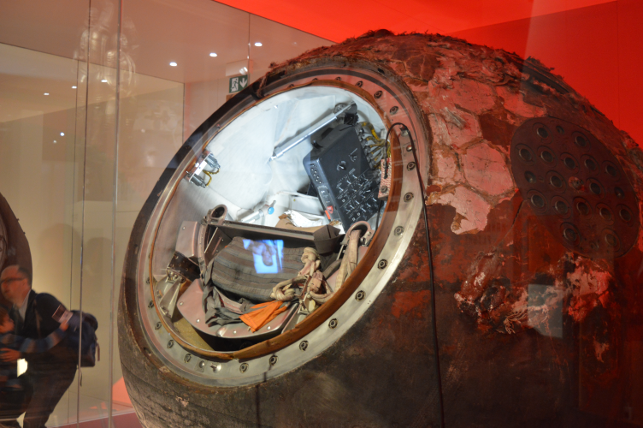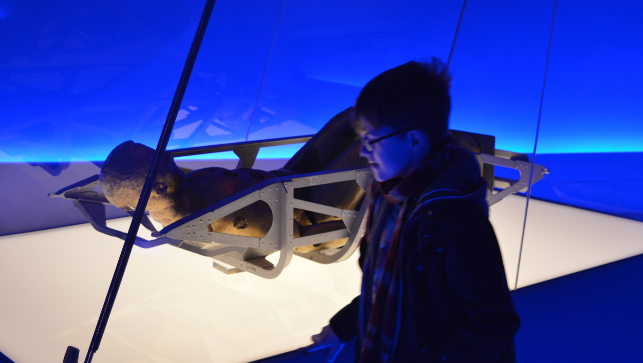With space exploration hitting the headlines, Al Dean took some time out to explore the Cosmonauts exhibition at the Science Museum and ponder how the new space race might influence the next generation of engineers

Tereshova’s Vostok lander
One of my earliest memories is playing with my much older brother’s toys in our old house on the Essex coast.
One particular toy was a scale model of NASA’s lunar lander, probably from Airfix. With my late brother being 17 years older than me, this Airfix model had seen better days, but was still rather intriguing, particularly sat alongside other vehicles from Space 1999 and Captain Scarlett.
Kids who grew up in the era of the Space Race saw mission after mission get into orbit, then visit the moon. The generations that followed saw rockets launched and the Space Shuttle take flight. We also witnessed tragedy, too, but human instinct is to explore and millions were captivated across the globe.
In more recent years, such inspiration sometimes seemed sadly lacking. Shuttle missions became almost routine. Ferrying staff to and from the International Space Station (ISS) seemed to be the main point of space travel. Unless you were following closely, it all looked pretty humdrum.
A new space race
Then something changed. Virgin Galactic launched, with the help of Burt Rutan’s team and its wizardry with rockets and composites.
Space X and Blue Origin began their battle for reusable rockets. And of course, Tim Peake became Britain’s first astronaut on the ISS in a flurry of headlines.
At the same time, cinemas were invaded by an army of ‘space science’ movies: no aliens, no light sabers, just regular people, struggling in harsh conditions and dangerous situations, in Gravity, Interstellar, The Martian and other films still to come.
What I also noticed was that my lad’s interest in space also picked up around this time. This led to us taking an hour or two to wander around the Science Museum’s Cosmonauts exhibition, on a recent trip to the capital. If you’re in London, do visit.
It centres on an amazing collection, on loan from Russia, showing what was possible with national support and a desire to beat the Americans. They may not have got to the Moon first, but the Russians notched up plenty of other ‘firsts’: Gagarin was the first man in space, Kereshova the first woman, and don’t get me started on poor Laika.
What’s different today is that space exploration isn’t about national pride and one-upmanship. On one hand, it’s the focus of collaborative, international efforts, driven by research and academia. On the other, it has a real commercial streak, and is driven forward by entrepreneurial vision.
Elon Musk’s Space X and rival Blue Origin (which is being bankrolled by Amazon.com’s Jeff Bezos) are both chasing reusable rockets for a couple of reasons.
One reason is undoubtedly because they can (and who can argue with some of the richest people in the world?). But the other, arguably more important reason, is because they believe there’s a serious profit to be made from it.
Contracts to supply the ISS are potentially worth billions and, on top of that, there’s all the commercial work involved in launching satellites into orbit. There might not be an atmosphere up there, but there is a shittonne of cash.
Where I’m getting to with this is that there’s constant talk about the engineering skills gap and concern that industry isn’t being fed the people it needs. Governments and industry bodies are constantly scrabbling around, trying to plug that gap, concocting all manner of programmes and initiatives intended to spark kids’ interest in pursuing careers in engineering and science.

One enthralled boy and the final exhibit
The spark we need?
The reality is that slogans and programmes won’t overcome perceptions that science and engineering aren’t exciting. The inspiration and desire to pursue a technical career must come from the heart and mind.
Since the 1960s, space exploration has provided that spark. How many of today’s senior designers and engineers got their passion from watching the Moon Landings and following the Apollo and Vostok missions? A fair percentage, I’d imagine.
Perhaps we’ll see a new generation inspired by more recent developments, by seeing YouTube videos of Space X, for example, planting a rocket back onto a landing pad with amazing precision.
To quote Matt Damon’s character in The Martian, if we want to inspire the next generation of engineers, we’re going to have to “science the shit out of this.”
Could the new space race influence the next generation of engineers?
Default






